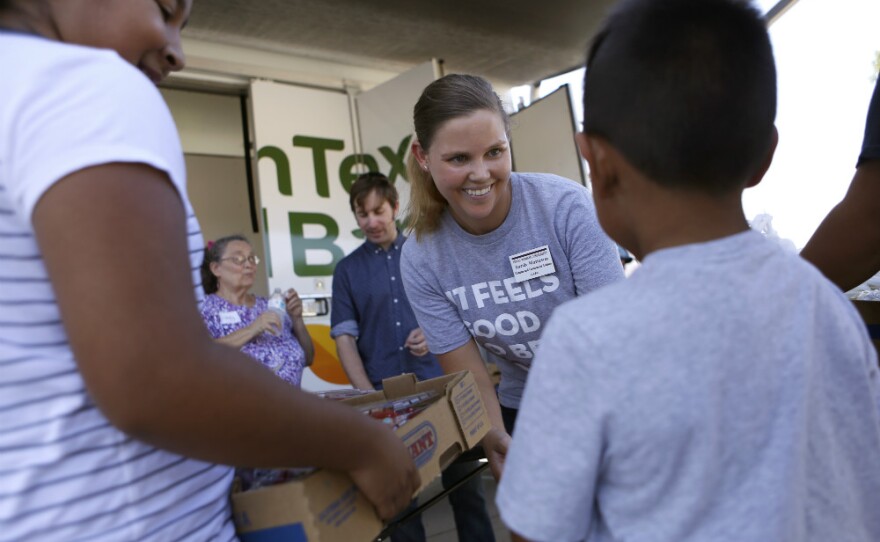Sarah Matteson, who works at Texas Woman's University in Denton, helps “nontraditional” students get through college. Students range from homeless kids and those who were in foster care or the military to parents raising young children.
When Matteson entered school, she was nontraditional herself.
Matteson grew up in Susanville, Calif., population 15,000. When she started college 100 miles away at Chico State, she had just aged out of foster care and was practically homeless.
“When I turned 18, my foster parents dropped me off in my college town and left," she says. "I didn’t have anybody to go to, and then I was on my own since then.”
Matteson studied social work, got married, and now has two children, ages 4 and 7.
She finished school in Texas, then got an advanced degree at TWU. Today, she works at the school helping students who are, in a lot of ways, just like she was.
She advises them as they navigate complex college life — something they may know nothing about. Of the more than 200 students she helped last semester, 55 were former foster care kids.

Providing — and teaching — the basics
Matteson also helps run the school’s monthly mobile food pantry with the North Texas Food Bank.
Last week, the truck was parked under tall shade trees on the TWU campus. Despite the soaring heat, fresh fruit and vegetables — all free — brought out several dozen people from Denton, including Stacy Richter.
“Right now, my boyfriend and I, he’s going to school at UNT, I’m the only one with a job and it’s part time. Anytime I can get produce I’m going to do that at this point. I’m expecting a baby in November,” Richter says.
Most who show up here for produce every month, Matteson says, are not traditional TWU students. Often, they need more than just the food.
“In Texas especially, 75 percent — that’s a really rough estimate — end up out of foster care not knowing basic life skills, like how to cook, what consists of a healthy meal, what kind of items you’ll even need to cook a meal,” she says.
Matteson shares that information, too — because it matters. There’s also more going on here. Healthy meals can contribute to healthy families, like the one she wished for growing up. She moved to Texas because her husband and his expansive family live here.

“So my husband’s family — he is the youngest of eight, six of the eight plus his mom — [is] local,” Matteson explains. “And, we see them multiple times a week. Mainly, we see them every single Sunday for family dinner, which is about 35 of us every Sunday.”
With community help, Matteson even prepared Thanksgiving dinner last year for TWU students who’d aged out of foster care.
Changing lives for generations
Almost as soon as she earned her master’s degree, she was hired by TWU’s Amy O’Keefe, the executive director of CARE: Campus Alliance for Resource Education.

O’Keefe and Matteson keep TWU true to its mission, according to Chancellor and President Carine Feyten, who's also a member of KERA’s board.
“If you think about the disenfranchised groups that we have in our society,” Feyten says, “giving them a chance to earn a degree and be able to thrive is huge, in the sense that now they have an opportunity to not become a statistic. This will not only change their lives but the lives of their children and every generation after that.”
TWU Vice President Monica Mendez-Grant says the school’s record with O’Keefe and Matteson speaks for itself.
“When you look at students who are engaged in foster care, the success rate nationally is 3 percent. The success rate in the state of Texas is about 3 percent. But then, when you look at students who are coming to school at TWU, our success rate is over 50 percent,” Mendez-Grant says.
Proof, she adds, that Sarah Matteson is making a difference.
This summer, KERA's education reporters are profiling folks making a difference in North Texas schools. We're calling them American Graduate Champions.




